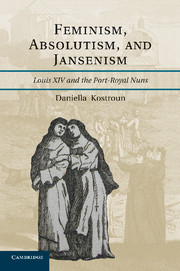Book contents
- Frontmatter
- Contents
- Acknowledgments
- Abbreviations
- Introduction
- 1 Jansenism as a “Woman Problem”
- 2 Controversy and Reform at Port-Royal
- 3 Jansenism's Political Turn, 1652–1661
- 4 The Limits to Obedience, 1661–1664
- 5 A Feminist Response to Absolutism, 1664–1669
- 6 The Unsettled Peace, 1669–1679
- 7 A Royal Victory, 1679–1709
- Conclusion
- Bibliography
- Index
- References
3 - Jansenism's Political Turn, 1652–1661
Published online by Cambridge University Press: 05 August 2011
- Frontmatter
- Contents
- Acknowledgments
- Abbreviations
- Introduction
- 1 Jansenism as a “Woman Problem”
- 2 Controversy and Reform at Port-Royal
- 3 Jansenism's Political Turn, 1652–1661
- 4 The Limits to Obedience, 1661–1664
- 5 A Feminist Response to Absolutism, 1664–1669
- 6 The Unsettled Peace, 1669–1679
- 7 A Royal Victory, 1679–1709
- Conclusion
- Bibliography
- Index
- References
Summary
The first decade of the Jansenist debates set in place a reciprocal dynamic between polemical attacks against Jansen and the Port-Royal nuns' reform efforts in which each process motivated the other toward greater intensity. This dynamic continued until the convent's destruction in 1709. Over the years, however, other social and political developments in France provided new contexts for this dynamic that added meaning and purpose for those engaged in the Jansenist controversy. The first of these developments was the outbreak of the civil wars known as the Fronde (1648–53).
One way the Fronde transformed the Jansenist debates was by providing the Arnauld women with a new context for promoting Port-Royal's mission against Jesuit sin. The siege of Paris in 1651 forced hundreds of nuns living outside the capital – including Angélique, who had returned to Port-Royal-des-Champs with a group of nuns in 1648 – to seek refuge from pillaging and marauding troops within the city's walls. Many of these displaced nuns visited Port-Royal seeking charity and to satisfy their curiosity sparked by the negative rumors surrounding the convent. The Port-Royal nuns met these needs by welcoming refugee nuns into their cloister and teaching them about their reform. For many women, Port-Royal's emphasis on turning adversity into spiritual renewal and on a disciplined observance of its rule contrasted starkly with Mazarin's and Anne of Austria's alleged immorality and inability to maintain order.
- Type
- Chapter
- Information
- Feminism, Absolutism, and JansenismLouis XIV and the Port-Royal Nuns, pp. 78 - 103Publisher: Cambridge University PressPrint publication year: 2011



